Table of Contents
The Board of Secondary Education, Rajasthan (BSER) has officially released the notification for the REET 2025 exam, and the detailed syllabus is now available on their official website. Candidates preparing for the exam should carefully review the updated REET Syllabus 2025 for both Level 1 and Level 2. The REET exam is conducted in two levels: Level 1 for primary teachers (teaching classes 1 to 5) and Level 2 for upper primary teachers (teaching classes 6 to 8). BSER has made the REET Syllabus 2025 available for both levels, which can be easily accessed through the article below for comprehensive guidance.
REET Syllabus 2025 – Overview
Understanding the syllabus will aid candidates in developing an effective preparation strategy. REET Exam Date 2025 has been announced to be conducted on 27 and 28 February 2025. The highlights of the REET Syllabus 2025 are that there have been some changes where new topics have been introduced to various subjects and sections at both levels. Candidates preparing for the REET Exam are advised to go through the new changes and prepare accordingly.
| REET Syllabus 2025 – Highlights | |
|---|---|
| Name of the Board | Board of Secondary Education, Rajasthan |
| Name of the posts | Grade III Teacher |
| Examination Name | Rajasthan Eligibility Exam For Teachers (REET 2024) |
| Category | Exam Pattern & Syllabus (New) |
| REET Exam Date 2025 | 27 February 2025 |
| Papers | Level 1 paper & Level 2 Paper |
| Nature of Exam | Qualifying |
| Total Questions | 150 (each level) |
| Total Marks | 150 (each level) |
| Negative Making |
|
| Selection Process | Written Exam and Document Verification |
| Official Website | www.rajeduboard.rajasthan.gov.in |
REET Exam Pattern 2025
Candidates can apply for both Level 1 and Level 2 exams to qualify for the third-grade teaching positions. Those aiming to teach at both the primary level (classes I to V) and upper primary level (classes VI to VIII) must take both Paper I and Paper II. A thorough understanding of the REET Syllabus 2025 is important for devising an effective preparation plan. In this article, candidates can download the complete REET Syllabus Level 2 PDF. The Rajasthan TET is commonly known as the REET exam in the state.
- Total Questions -150
- Total Marks -150
- Total time – 2.5 hr
- Negative Marking – No negative marking for incorrect answer
- Introduced 5th Option- Negative of 1/3 marks introduced for each unattempted question. Mark the 5th Option “None of the Above” to avoid negative marking.
- Paper 1 – Primary level i.e. class I to V
- Paper 2 – Secondary level i.e. class VI to VIII.
REET Exam Pattern Level I & II
Check out the REET Exam Pattern & Marks Distribution in detail. In the following tables, the candidates will find the marks distribution for Level-1 and Level-2 REET Exam 2025.
REET Exam Pattern for Level 1 (Class 1-5)
The REET 2025 Paper-I is designed for candidates intending to teach at the primary stage for Classes I to V. The exam consists of a total of 150 questions, each carrying one mark, making the total possible score 150 marks. The paper is divided into five subjects: Child Development and Pedagogy (30 questions), Language I (compulsory, 30 questions), Language II (compulsory, 30 questions), Mathematics (30 questions), and Environmental Studies (30 questions). Each subject assesses the candidates’ understanding of key concepts relevant to teaching young learners, focusing on both pedagogical knowledge and subject-specific skills.
| REET Exam Pattern 2025 | |||
|---|---|---|---|
| S No. | Subjects | No. Of Questions | Marks |
| 1 | Child Development and Pedagogy | 30 | 30 |
| 2 | The language I (compulsory) | 30 | 30 |
| 3 | Language II (compulsory) | 30 | 30 |
| 4 | Mathematics | 30 | 30 |
| 5 | Environmental Studies | 30 | 30 |
| Total | 150 | 150 | |
REET Level-II Exam Pattern
The REET 2025 Paper-II is aimed at candidates who wish to teach at the elementary stage for Classes VI to VIII. This paper consists of a total of 150 questions, with each question worth one mark, totaling 150 marks. It is structured into four subjects: Child Development and Pedagogy (30 questions), Language I (compulsory, 30 questions), Language II (compulsory, 30 questions), and a combined section on Mathematics & Science, Social Studies/Social Science, or Any Other Subject (60 questions). This format allows candidates to increase their knowledge and understanding of child development, pedagogical strategies, and subject-specific expertise, essential for effectively teaching upper elementary students.
| S.No. | Subjects | No. of Questions | Marks |
|---|---|---|---|
| 1 | Child Development and Pedagogy | 30 | 30 |
| 2 | The language I (compulsory) | 30 | 30 |
| 3 | Language II (compulsory) | 30 | 30 |
| 4 | Mathematics & Science Or Social Studies/Social Science Or Any Other Subject |
60 | 60 |
| Total | 150 | 150 |
REET Syllabus for Levels 1 & 2
The REET Syllabus Level 1 and 2 is a crucial resource for candidates aiming to excel in the REET Exam. It allows candidates to prepare systematically, focusing on each topic individually to ensure comprehensive understanding. To develop an effective exam strategy, candidates need to follow the REET Syllabus 2025, as it outlines the subjects and topics to be covered.
For convenience, we have provided the detailed REET New Syllabus, which candidates can refer to for structured preparation. Additionally, section-wise REET Syllabus 2025 PDF Download through the direct links provided below, enabling easy access to all necessary study materials.
REET Syllabus Level 1
The REET Syllabus Level 1 prepares aspiring teachers for Classes 1 to 5 by providing a thorough understanding of child development, language skills, basic mathematics, and environmental awareness. It explores child psychology, learning principles, and effective teaching methods. Candidates will enhance their proficiency in Hindi and English (or another selected language), address fundamental mathematical concepts such as numbers, operations, and geometry, and discover the wonders of the natural environment.
The syllabus prioritizes inclusivity, accommodating diverse learning needs, and fostering a supportive classroom atmosphere. By mastering these areas, candidates will be well-equipped to guide young learners on their journey toward knowledge and personal development. The Rajasthan TET or REET Syllabus Level 1 has been published on the official Rajasthan TET website.
Check: REET Level 2 Syllabus 2025
REET Syllabus 2025: Child Development & Pedagogy
The Child Development & Pedagogy section in the REET Pre Syllabus generally covers topics related to educational psychology and teaching methodologies. It assesses candidates’ understanding of child psychology, cognitive development, learning theories, and educational practices. The REET Syllabus 2025 may include concepts such as cognitive development stages, learning theories, intelligence, personality development, and inclusive education.
- Child Development: Concept of growth and development, Principles and dimensions of development. Factors affecting development (especially in the context of family and school) and its relationship with learning.
- Role of Heredity and Environment
- Meaning and Concept of learning and its processes. Factors Affecting learning
- Theories of learning and its implications
- How children learn, Learning process, Reflection, Imagination, and Argument
- Motivation and Implications for Learning
- Individual Differences:- Meaning, Types, and Factors Affecting Individual Differences Understanding individual differences.
- Personality:- Concept and types of personality, Factors responsible for shaping it, and Its measurement
- Intelligence:- Concept, Theories, and its measurement. Multidimensional Intelligence and Its Implication.
- Understanding diverse learners:- Backward, Mentally retarded, gifted, creative, disadvantaged and deprived, specially-abled, CWSN, children with learning disabilities
- Learning Difficulties.
- Adjustment:- Concept and ways of adjustment. Role of teacher in the adjustment.
- Teaching-learning process, Teaching learning strategies and methods in the context of National Curriculum Framework 2005.
- Meaning and purposes of Assessment, Measurement, and Evaluation. Comprehensive and Continuous Evaluation. Construction of Achievement Test, Learning outcomes
- Action Research.
- Right to Education Act 2009 (Role and Responsibilities of Teachers)
- National Education Policy (2020) (New)
- Early Childhood Care and Education (New)
- Foundational Literacy and Numeracy (New)
- Curriculum and Pedagogy in Schools (New)
- Teacher (New)
- Equitable and Inclusive Education (New)
- Standard-setting and Accreditation (New)
- Contemporary Child Welfare Educational Schemes of Rajasthan (New)
REET Syllabus 2025: Mathematics
The Mathematics section of the REET Pre Syllabus covers primary and upper primary mathematics, including arithmetic, geometry, algebra, and pedagogy.
- Whole numbers up to one crore, Place Value, Comparison; Fundamental mathematical operations: Addition, Subtraction, Multiplication and Division, Indian Currency.
- Concept of fractions, proper fractions, comparison of proper fractions of the same denominator, mixed fractions, comparison of proper fractions of unequal denominators, and Addition and Subtraction of fractions. Prime and composite numbers, Prime factors, Lowest Common Multiple (LCM), and Highest Common Factor (HCF).
- Unitary law, Average, Profit – Loss, simple interest
- Plane and curved surfaces, plane and solid geometrical figures, properties of plane geometrical figures, point, line, ray, line segment, Angle and their types.
- Length, Weight, Capacity, Time, Measurement of area and their standard units and the relation between them; Area and perimeter of plane surfaces of square and rectangular objects.
- Nature of Mathematics/Logical Thinking
- Place of Mathematics in Curriculum
- Language of Mathematics
- Community Mathematics
- Data Management
- Evaluation through formal and informal methods
- Problems of Teaching
- Error analysis and related aspects of learning and teaching
- Diagnostic and Remedial Teaching
- Vedic Maths (New)
REET Syllabus 2025: Environment Studies
The REET Syllabus 2025 covers environmental science, ecology, biodiversity, and pedagogy for teaching environmental studies to primary and upper-primary-level students.
- Family – Personal relationships, nuclear and joint families, social abuses (child marriage, dowry system, child labor, theft); addiction (intoxication, smoking) and its personal, social, and economic bad effects.
- Clothes and Habitats – Clothes for different seasons; maintenance of clothes at home; handloom and power loom; habitats of living beings, various types of houses; cleanliness of houses and neighboring areas; Different types of materials for building houses.
- Profession – Profession of your surroundings (stitching clothes, gardening, farming, animal rearing, vegetable vendor, etc.), small and cottage industries; major industries of Rajasthan State, Need for consumer protection, co-operative societies.
- Public places and Institutions – Public places like schools, hospitals, post offices, bus stands, and railway stations; Public property (street lights, roads, bus, train, public buildings, etc.); wastage of electricity and water; employment policies; general information about Panchayat, legislative assembly, and parliament.
- Our Culture and Civilization and Pride – Fairs and festivals of Rajasthan, National festivals, Dresses, and ornaments of Rajasthan, food habits, architecture, fort, places, painting and art and craft of Rajasthan; Tourist places of Rajasthan; Great personalities of Rajasthan, Proverb of Maharana Pratap, Mahatma Gandhi
- Panchayat Raj and Urban Self government in Rajasthan
- Transport and Communication – Means of transport and communication; Rules for pedestrians and transport, traffic symbols, Effects of means of communication on the lifestyle.
- Personal Hygiene – External parts of our body and their cleanliness; general information about the internal parts of the body; Balanced diet and its importance; Common diseases (gastroenteritis, amoebiasis, methemoglobin, anemia, fluorosis, malaria, dengue.), their causes and methods of prevention: Pulse Polio campaign.
- Living Beings- Levels of organization of plants and animals, diversity of living organisms, state flower, state tree, state bird, state animal; knowledge of reserve forest and wildlife (national parks, sanctuaries, tiger reserve, world heritage), conservation of species of plants and animals, agriculture species.
- Water – Basic knowledge of water, forests, wetlands, and deserts, different kinds of pollution and pollution control, and Water Properties. Sources, Management.
- Mountaineering – Equipment, Problem, Main women mountaineer of India
- The Earth and Space – Our Solar Systems, Indian Astronauts
- Concept and Scope of Environment Studies
- Significance of Environment Studies, Integrated Environment Studies
- Environmental Studies & Environmental Education Learning Principles
- Scope & relation to Science & Social Science
- Approaches of presenting concepts
- Activities
- Experimentation/Practical Work
- Discussion
- Comprehensive and Continuous Evaluation
- Teaching material/Aids
- Problems of Teaching
- General Knowledge of Rajasthan (New)
REET Level 1 Syllabus of Language I
(A) Hindi Language (L1):
- एक अपठित गद्यांश में से निम्नलिखित व्याकरण संबंधी प्रश्न :- पर्यायवाची, विलोम, एकार्थी शब्द ,शब्दार्थ, शब्द शुधि। उपसर्ग, प्रत्यय, संधि और समास। संज्ञा, सर्वनाम, विशेषण, अव्यय।
- एक अपठित गद्यांश में से निम्नलिखित बिंदुओं पर प्रश्न :- रेखांकित शब्दों का अर्थ स्पष्ट करना, वचन, काल, लिंग ज्ञात करना। दिए गए शब्दों का वचन काल और लिंग बदलना।
- वाक्य रचना, वाक्य के अंग, वाक्य के प्रकार, पदबंध, मुहावरे और लोकोक्तियाँ , विराम चिन्ह।
- भाषा की शिक्षण विधि, भाषा शिक्षण के उपागम, भाषा दक्षता का विकास।
- भाषायी कौशलों का विकास (सुनना, बोलना, पढ़ना, लिखना) हिंदी भाषा शिक्षण में चुनौतियाँ, शिक्षण अधिगम सामग्री, पाठ्य पुस्तक, बहु-माध्यम एवं शिक्षण के अन्य संसाधन।
- भाषा शिक्षण में मूल्यांकन, उपलब्धि परीक्षण का निर्माण समग्र एवं सतत् मूल्यांकन, उपचारात्मक शिक्षण।
- राजस्थानी भाषा और साहित्य की सामान्य जानकारी। (New)
(B) English Language (L1):
- Unseen Prose Passage: Synonyms, Antonyms, Spellings, Word-formation, One Word Substitution
- Unseen Prose Passage: Parts of Speech, Tenses, Determiners, Degrees of Comparison
- Framing Questions Including Wh – questions, Active and Passive Voice, Narration, Knowledge of English Sounds and Phonetic Symbols
- Principles of Teaching English, Methods, and Approaches to English Language Teaching
- Development of Language Skills, Teaching Learning Materials: Textbooks, Multi-Media Materials, and Other Resources
- Comprehensive & Continuous Evaluation, Evaluation in the English Language
REET Level 1 Syllabus of Language II
(A) Hindi Language (L2):
- एक अपठित गद्यांश आधारित निम्नलिखित व्याकरण संबंधी प्रश्न :युग्म शब्द, वाक्यांश के लिए एक शब्द, शब्द शुधि, उपसर्ग, प्रत्यय, संधि, समास, संज्ञा, सर्वनाम, विशेषण, क्रिया, लिंग, वचन, काल ।
- एक अपठित पद्यांश पर आधारित निम्नलिखित बिंदुओं पर प्रश्न :
- भाव सौंदर्य
- विचार सौंदर्य
- नाद सौंदर्य
- शिल्प सौंदर्य
- जीवन दृष्टि
- वाक्य रचना, वाक्य के अंग, वाक्य के भेद, पदबंध, मुहावरे, लोकोक्तियाँ। कारक चिहन, अव्यय, विराम चिन्ह।
- भाषा शिक्षण विधि, भाषा शिक्षण के उपागम, भाषायी दक्षता का विकास।
- भाषायी कौशलों का विकास (सुनना, बोलना, पढ़ना, लिखना) शिक्षण अधिगम सामग्री-पाठ्य पुस्तक, बहु-माध्यम एवं शिक्षण के अन्य संसाधन।
- भाषा शिक्षण में मूल्यांकन, (सुनना, बोलना, पढ़ना, लिखना) उपलब्धि परीक्षण का निर्माण समग्र एवं सतत् मूल्यांकन। उपचारात्मक शिक्षण।
- राजस्थानी भाषा और साहित्य की सामान्य जानकारी। (New)
(B) English Language (L2):
- Unseen Prose Passage: Linking Devices, Subject-Verb Concord, Inferences
- Unseen Poem: Identification of Alliteration, Simile, Metaphor Personification, Assonance, Rhyme
- Modal Auxiliaries, Common Idioms, and Phrases, Literary Terms: Elegy, Sonnet, Short Story, Drama
- Basic knowledge of English Sounds and symbols
- Principles of Teaching English, Communicative Approach to English Language Teaching, Challenges of Teaching English: Language Difficulties, Role of home language, multilingualism
- Methods of Evaluation, Remedial Teaching
REET Syllabus Level 1 PDF
The REET syllabus for both levels is conveniently available in PDF format on the official website of the Board of Secondary Education, Rajasthan (BSER). Aspiring teachers can easily access the REET Level 1 and REET Syllabus Level 2, providing a detailed roadmap for their exam preparation. The REET Syllabus Level 1 focuses on Child Development and Pedagogy, Languages (Hindi and English), Mathematics, and Environmental Studies, aiming to build a solid foundation for teaching children in grades 1 to 5. On the other hand, the REET Syllabus Level 2 delves into specialized subjects such as Science or Social Studies, along with Child Development and Pedagogy, Mathematics, and Languages, preparing candidates to teach students in grades 6 to 8.
- The REET Syllabus Level 1 covers Child Development and Pedagogy, Languages (Hindi and English), Mathematics, and Environmental Studies. It focuses on laying a strong foundation for teaching young children in grades 1 to 5.
- The REET Syllabus Level 2 dives deeper into specific subjects like Science or Social Studies, along with Child Development and Pedagogy, Mathematics, and Languages. REET level 2 prepares candidates for teaching grades 6 to 8.
| REET Syllabus Level 1 PDF Download |
||
| REET Old Syllabus | REET New Syllabus | |
| REET Syllabus Level 1 (In Hindi) | Download in Hindi | Download REET New Syllabus Level 1 |
| REET Syllabus Level 1 (In English) | Download in English | |
| REET Level 2 Syllabus 2025 | Check This | Level 2 Syllabus |
BSER Introduces 5th Option in REET Exam 2025
BSER has introduced a 5th Option to the already existing 4 alternatives from which candidates had to choose a correct answer. Now, candidates are given a 5th option which is “None of the Above”. In case candidates do not know the correct answer to any question, they must opt for the 5th option.
The purpose of this option is to compel candidates to choose the options and not leave any questions unattempted or blank. The New OMR Sheet will have this 5th Option and candidates should remember to mark the 5th option instead of leaving a question blank or unattempted. In case, candidates still leave the answer unattempted then 1/3 marks will be deducted a negative marking.
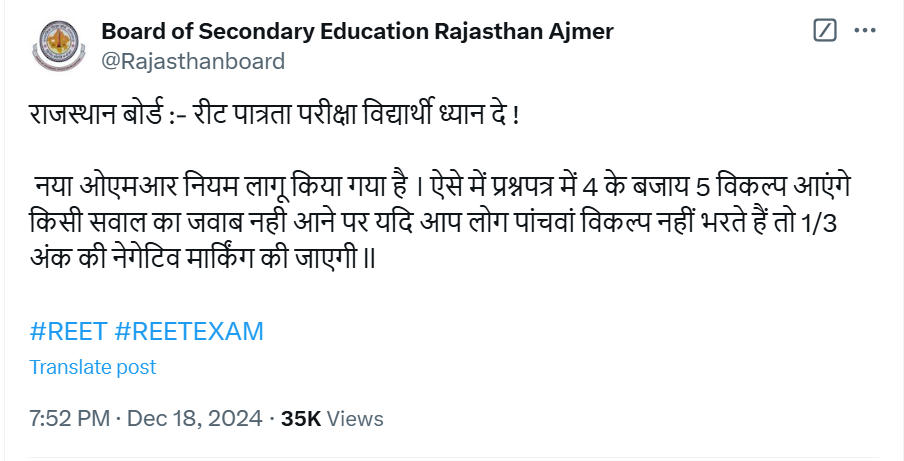
REET New Syllabus for Grade 3 Teachers Exam
The candidates need to carefully read and understand the new REET Exam Pattern 2025 for the Grade 3 Teachers Exam. Candidates will now have to appear for a separate entrance exam for the Grade 3 Teacher Exam. Thus, the candidates will have to prepare for the Grade 3 Teacher Exam based on the new REET Syllabus 2025 and exam pattern as mentioned below. The candidates will have to solve 150 questions of 300 marks in 2 hours and 30 minutes. Rajasthan Board has introduced a negative marking of 1/3 marks for each wrong answer.
| New REET Syllabus 2025 PDF | |
| Total Marks | 300 Marks |
| Total Number of Questions | 150 Marks |
| Marking Scheme |
|
| Negative Marking | Yes |
| Duration of Exam | 2 hours and 30 minutes |
| Papers | Paper-I
Paper-II |
Rajasthan Grade 3 Recruitment Level-I Exam Pattern & Marks Distribution 2025 (NEW)
The REET Level-I will have a new marks distribution pattern. There will be 150 questions with 300 marks in total. There will be a negative marking of 1/3 marks for each incorrect answer. The level of content for REET Level-I will be of secondary level and the difficulty level will be of higher secondary level.
| REET New Syllabus 2025 |
||
| Section | Subject/Topic | Marks |
| 1 | Geographical, Historical, and Cultural Knowledge of Rajasthan | 90 Marks |
| 2 | General Knowledge of Rajasthan, Right of Children to Free and Compulsory Education Act 2009, Current Affairs | 90 Marks |
| 3 | School Subjects | |
| a: Hindi | 10 Marks | |
| b: English | 10 Marks | |
| c: Mathematics | 10 Marks | |
| d: General Science | 10 Marks | |
| e: Social Studies | 10 Marks | |
| 4 | Education Methodology | |
| a: Hindi | 8 Marks | |
| b: English | 8 Marks | |
| c: Mathematics | 8 Marks | |
| d: General Science | 8 Marks | |
| e: Social Studies | 8 Marks | |
| 5 | Educational Psychology | 20 Marks |
| 6 | Information Technology | 10 Marks |
| Total | 300 Marks | |
| Note: The level of the content of the school subjects will be of secondary level and the difficulty level will be of higher secondary level. | ||
Rajasthan Grade 3 Recruitment Level-II Exam Pattern & Marks Distribution 2025 (NEW)
The REET Level-II will have a new marks distribution pattern. There will be 150 questions with 300 marks in total. There will be a negative marking of 1/3 marks for each incorrect answer. The level of content for REET Level-II will be of a higher secondary level and the difficulty level will be of graduation level.
| REET New Syllabus PDF | ||
| Section | Subject/Topic | Marks |
| 1 | Geographical, Historical, and Cultural Knowledge of Rajasthan | 70 Marks |
| 2 | General Knowledge of Rajasthan, Right of Children to Free and Compulsory Education Act, 2009, Current Affairs | 60 Marks |
| 3 | Knowledge of Concerned School Subjects | 120 Marks |
| 4 | Pedagogical Methodology | 20 Marks |
| 5 | Educational Psychology | 20 Marks |
| 6 | Information Technology | 10 Marks |
| Total | 300 Marks | |
| Note: The level of the content of the school subjects will be of a higher secondary level and the difficulty level will be of graduation level. | ||

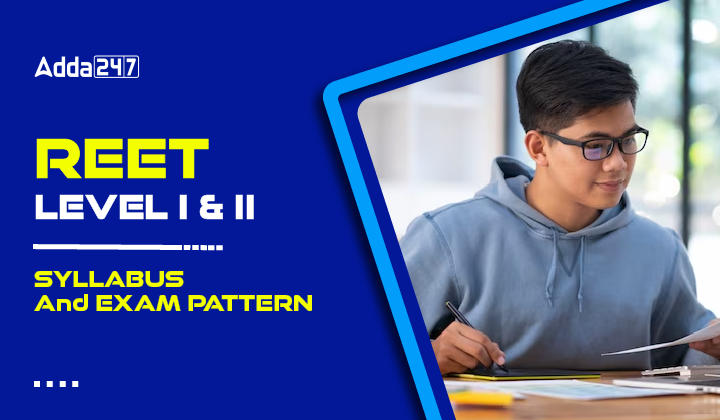
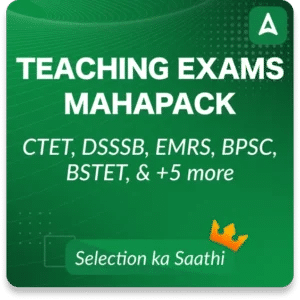

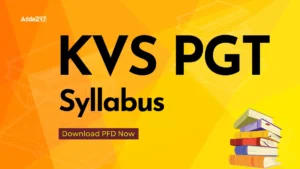 KVS PGT Syllabus 2025, Download PGT Syll...
KVS PGT Syllabus 2025, Download PGT Syll...
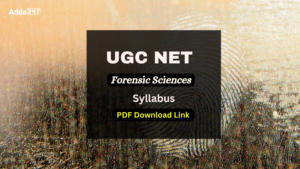 UGC NET Forensic Science Syllabus 2025 a...
UGC NET Forensic Science Syllabus 2025 a...
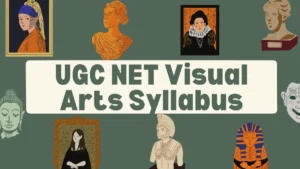 UGC NET Visual Arts Syllabus 2025 PDF Do...
UGC NET Visual Arts Syllabus 2025 PDF Do...














